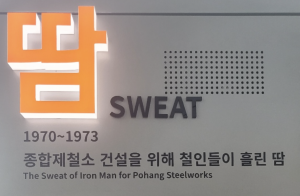Pohang: POSCO Museum
Photo essay of wall text of POSCO Museum of Pohang

Photo essay of wall text of POSCO Museum of Pohang

I am a (science) education researcher and look at most things in the world through the lens of education. On disaster (or anything else), the questions I ask are - e.g., why should we teach about it? What should we teach about it, and how? How can we support teachers to teach about disasters in their classrooms? My training in educational research has equipped me with the theories, tools and methods that can be utilised to approach these questions. I am hoping that these knowledge, experiences and skills can cross-fertilise with EcoGovLab's expertise in anthropology, SPS and environmental governance.
One of our greatest responsibilities is to prepare the next generation to meet the challenges they will face in the 21st Century, with a deep commitment to the rights and responsibilities of U.S. citizenship. We have a unique opportunity for a community dialogue about the civic values, knowledge, and skills that K-12 students should learn and practice in our public school system. We will create strong community support for our schools to provide effective civic education for students to be successful in college, career and citizenship.
The mission of the Civic Education Center is to restore civility in America by creating opportunities for youth to learn and practice civic values and democratic skills.
Goals
The Mission of CV YEA is "Our mission is to fight environmental injustices in the Central Valley through connecting like-minded individuals".
CV YEA is based in Fresno, CA and led by Executive Director Kamryn Kubose (interview), who we met during our visit to Golden Charter Academy. CV YEA takes part in Clean Vehicle Empowerment Collaborative. The board consists of master's students and environmental activists based in California.
XXX

Paul Farmer is the chair of the Department of GLobal Health and Social Medicine at Harvard Medical School. He is an expert in health care services and advocacy for those who are sick and in poverty. He doesn't appear to be situated in emergency response; he seems to be much more on the follow-up months or years later. Dr. Farmer has myriad publications of relevance to the Network, and his research foci are mostly regarding establishing high-quality health care in resource-poor environments. (http://ghsm.hms.harvard.edu/person/faculty/paul-farmer)
Bruce Nizeye works as the Chief of Infrastructure for PIH in Rwanda. It appears that his expertise is in physical constructs. I could not find how he was situated in emergency response, but it appears that he takes a role on the back side of disasters, much like Dr. Farmer. (http://www.pih.org/blog/the-voices-of-our-colleagues/)
Sara Stulac is an Associate Physician in the Division of Global Health Equity at BWH. She is also the Deputy Chief Medical Director for PIH. She seems to be an expert in pediatrics, specifically HIV care and prevention and oncology. Like her other authors mentioned on this page, she does not seem to be directly involved with emergency response. Her research foci are mostly not related to emergency response, but dealing with non-emergent pediatric care. (http://www.brighamandwomens.org/Departments_and_Services/medicine/servi…)
Salmaan Keshavjee is a professor at HMS and a physician at BWH. He has conducted research on post-Soviet Tajikistan's health transition and worked on an MDR-TB treatment program in Tomsk, Russia. Rather than emergency response, Dr. Keshavjee seems to be focused on epidemiology like his co-authors. He has a number of research foci including MDR-TB treatment and policy, health-sector reform in transnational societies, the role of NGOs in the formation of trans-border civil society, and "modernity, social institutions, civil society, and health in the Middle East and Central Asia. (http://ghsm.hms.harvard.edu/person/faculty/salmaan-keshavjee)
Users enter summaries of articles onto the website as well as replies on articles. Users also enter anti-spam information, email addresses, their names, and websites they may be associated with.
MSF is focused on providing aid where aid is needed, thus the name "Doctors without Borders." They don't care what the policital or socioeconomic status is in a region, they'll provide aid no matter what. They're also able to provide their own funding rather than relying upon that of local governments.